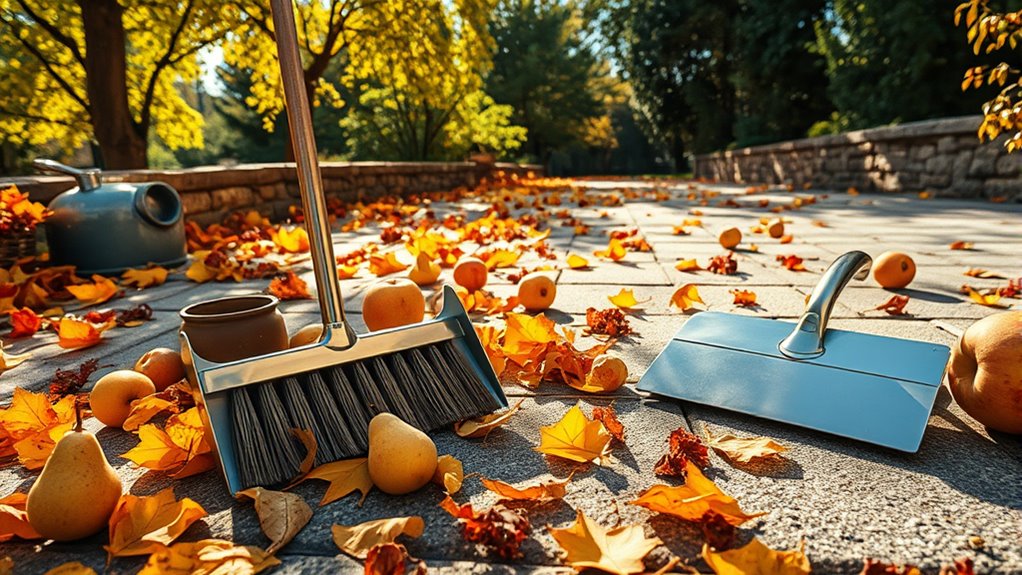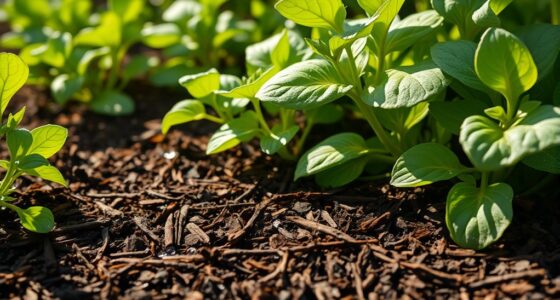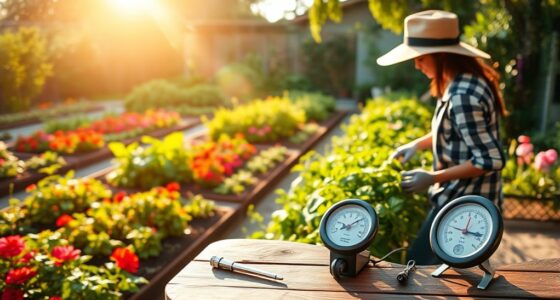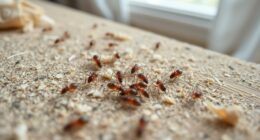Cleaning up fallen fruit and leaves quickly helps prevent pests, reduce disease risks, and keep your yard looking tidy. Removed fruit stops decay and limits insect and rodent attraction, while clearing leaves prevents mold, fungi, and damage to your grass or garden beds. Use tools like leaf blowers or composters to make the job easier and turn garden debris into nutrient-rich soil. Keep your outdoor space healthy and attractive by staying on top of yard cleanup—you’ll discover helpful tips to make it even easier.
Key Takeaways
- Regularly gather fallen fruit to prevent decay, pest attraction, and disease spread.
- Use leaf mulchers or rakes to collect leaves, then compost or dispose of them properly.
- Promptly remove moldy or diseased leaves to protect garden health and prevent pest issues.
- Compost organic debris like fruit and leaves to enrich soil and reduce yard waste.
- Maintain a tidy yard through consistent cleanup, promoting a healthier and more inviting outdoor space.
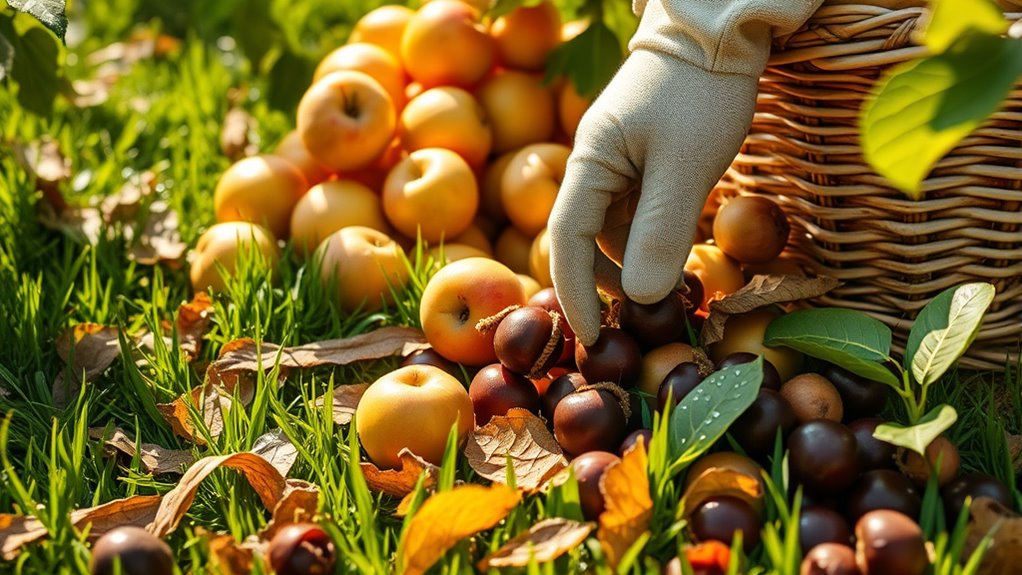
Fallen fruit and leaves can quickly clutter your yard and create potential problems if left unmanaged. The decaying fruit not only makes your outdoor space look untidy but also attracts pests like insects, rodents, and even raccoons. As fruit decays, it releases odors that can draw unwanted animals and contribute to the spread of diseases. Similarly, fallen leaves pile up, smothering grass and garden beds, which hampers growth and creates a breeding ground for mold and fungi. To keep your yard healthy and appealing, it’s essential to regularly clear away these debris and understand how to manage them effectively.
When you pick up fallen fruit promptly, you prevent it from decaying on the ground. Decayed fruit can harbor bacteria and fungi that accelerate the deterioration process, making your cleanup more urgent and your yard less inviting for pests. Instead of tossing away the fruit, consider composting it if you have the space and proper setup. Fruit composting is an eco-friendly way to recycle organic waste, turning it into nutrient-rich soil that benefits your garden. Just be sure to manage your compost properly, balancing greens and browns, and turning it regularly to prevent unpleasant odors and fruit decay from attracting critters. Using electric tools like electric leaf blowers or electric mulchers can make cleanup more efficient and environmentally friendly.
Leaves, on the other hand, can be used to create valuable leaf compost, which enriches your garden beds and lawns. Collect leaves into manageable piles or use a leaf mulcher to shred them before composting. The shredded leaves break down faster, releasing nutrients back into the soil and improving its structure. Leaf composting not only reduces yard waste but also provides a sustainable way to nourish your plants naturally. As you gather leaves, make sure to remove any that are moldy, diseased, or heavily contaminated with pesticides, since these can introduce problems into your compost and garden.
Regularly raking and removing fallen fruit and leaves is *essential* in maintaining a tidy yard and preventing issues related to decay. By composting fruit and leaves, you also contribute to a more sustainable yard care routine, turning waste into a resource. This approach minimizes the risk of pests and disease, keeps your outdoor space looking neat, and promotes healthier plants. Remember, the key is consistency; the more often you clear debris and manage your compost, the less likely you’ll face overwhelming messes or pest infestations. With these simple steps, your yard stays clean, healthy, and inviting all year round.
Frequently Asked Questions
How Often Should Fallen Fruit and Leaves Be Cleaned Up?
You should clean up fallen fruit and leaves at least once a week to prevent fruit decay and reduce pests. Regular removal helps keep your yard tidy and prevents the spread of disease. Compost the leaves to enrich your soil, but remove decayed fruit promptly to avoid attracting insects. Consistent cleanup guarantees your garden stays healthy and minimizes pest problems, making your outdoor space more enjoyable and easier to maintain.
What Tools Are Best for Removing Fallen Leaves Efficiently?
Imagine a gust of wind scattering leaves like confetti. To clear them efficiently, you’ll want a sturdy leaf rake for gentle sweeping and a leaf blower for quick cleanup. The rake helps gather stubborn leaves in tight spaces, while the blower quickly clears large areas or stubborn debris. Using both tools, you can transform your yard from a messy maze into a tidy haven with ease and speed.
Can Decaying Fruit Attract Pests or Diseases?
Decaying fruit can definitely attract pests like fruit flies and ants, increasing pest attraction around your yard. It also promotes the spread of diseases, as bacteria and fungi thrive on rotting materials. To prevent these issues, you should promptly pick up fallen fruit and leaves, and dispose of them properly. This minimizes pest attraction and helps reduce the risk of disease spread, keeping your garden healthier and pest-free.
Are There Eco-Friendly Methods for Disposing of Fallen Debris?
Imagine you’re collecting fallen fruit and leaves from your yard. You can use composting techniques as an eco-friendly method for organic disposal, turning debris into nutrient-rich soil. This natural process reduces waste and supports sustainable gardening. Composting is simple—layer organic materials, keep it moist, and turn it regularly. By choosing composting techniques, you’re adopting an environmentally friendly approach that minimizes landfill waste and promotes healthy ecosystems.
How Does Cleaning up Fallen Leaves Benefit Lawn Health?
Cleaning up fallen leaves benefits your lawn by preventing disease and pest buildup. When you mulch benefits by shredding leaves into the soil, it enriches nutrients and improves soil health. Leaf composting allows organic matter to break down naturally, returning essential nutrients to your lawn. Regularly removing and composting leaves also reduces mold growth and keeps your grass healthy, promoting a lush, vibrant yard.
Conclusion
By clearing away fallen fruit and leaves, you’re not just tidying your yard—you’re nurturing new beginnings. Each fruit removed symbolizes the shedding of old worries, making space for growth. Leaves swept aside represent letting go of past burdens, making room for fresh ideas and growth. As you clean, remember you’re cultivating a healthy, vibrant space where new opportunities can bloom. Your efforts mirror the cycle of renewal—embrace it, and watch your surroundings flourish.
